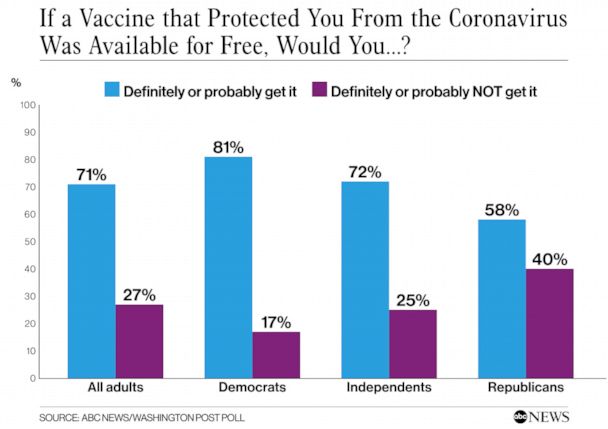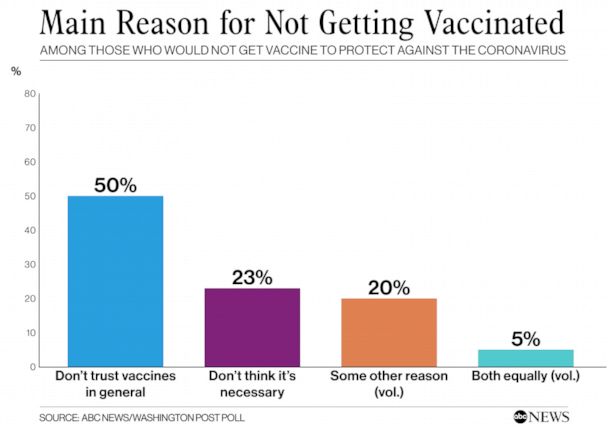27% unlikely to be vaccinated; Republicans, conservatives especially: POLL

Unpersuaded by more than 100,000 pandemic deaths in the United States, 45% of strong conservatives, four in 10 Republicans and nearly as many evangelical Christians say they'd be unlikely to get vaccinated against the coronavirus, even for free.
Overall, 27% of adults in an ABC News/Washington Post poll say they definitely (15%) or probably (12%) would not get the vaccine. Among them, half say they don't trust vaccines in general, while nearly a quarter don't think it's needed in this case.
See PDF for full results, charts and tables.
A plurality definitely would get vaccinated (43%) and 28% say they probably would. The net, 71%, is much higher than the adult vaccination rate for the standard seasonal flu - 45% in the 2018-19 flu season, according to the U.S. Centers for Disease Control and Prevention (with a wide range by state, from 34 to 56%.) It's much lower than the 2017 child vaccination rates for polio and measles/mumps/rubella, 93 and 92%, respectively.
A mix of groups express less interest in getting vaccinated - 46% of Republican women, 45% (as noted) very conservative Americans, 40% of Republicans and 37% of evangelical Christians.
Across the spectrum, 90% of Democratic men say they definitely or probably would get the vaccine, as would 81% of Democrats overall, and as many liberals in this poll, produced for ABC by Langer Research Associates.
Interest is higher, although not overwhelmingly high, among seniors - 77% - compared with all other adults, 69%.
The overall result is similar to other recent surveys (by Fox News, ABC/Ipsos, Pew Research and CNN) in which 23 to 33% of adults have said they would not get vaccinated or would not be likely to. By contrast, in a November 2009 ABC/Post survey, many more said they likely would not get vaccinated against the swine flu, 66%.
Experience/Expectations
Experience and expectations play a role in these intentions. For example, Americans living in hard-hit areas are especially likely to say they'd get the vaccine. Eighty-one percent of people in U.S. counties with the most COVID-19 cases say so, compared with 61% of those in counties with the fewest cases.
It's nearly as high, 78%, among Northeasterners and urban residents, vs. 65% in the South and 63% in rural areas. And among those who report that their lives have been disrupted by the pandemic, three-quarters say they'd get vaccinated. That drops to 55% of those who report little or no disruption.
Willingness also peaks among those most concerned about how the virus may affect them. Among those who are very worried that they or a family member will catch the virus, 85% say they definitely or probably would get vaccinated, as do 84% of those worried about a second wave of infections in the fall. That plummets among others; among those who are "not at all worried" about a second wave, for instance, just 35% say they'd get vaccinated.
Interest also relates to priorities. Among those who say it's more important to try to stop the spread of the virus, 81% say they're likely to get vaccinated, compared with 56% of those who say it's more important to try to restart the economy.
In a statistical analysis called regression, holding demographic and attitudinal factors constant, being black and being a woman are negative predictors of intention to get vaccinated. Positive predictors include being a Democrat, worry about catching the disease or about a second wave, and living in an urban area.
Reasons
As mentioned, half of those who definitely or probably wouldn't get vaccinated say they don't trust vaccines in general; 23% don't think it's necessary in this case. Five percent say both reasons are equally important and two in 10 cite other reasons.
Women who are disinclined to be vaccinated are more likely to say it's because they don't trust vaccines in general - 58% say so, compared with 42% of men who say they're unlikely to get vaccinated. These men, instead, are twice as likely as women in this group to say they think it's unnecessary in this particular case.
While sample sizes limit this analysis, one other difference emerges: People living in the South who are unlikely to get vaccinated are slightly more apt than those in other regions to say they don't trust vaccines overall, 57 vs. 45%.
Methodology
This ABC News/Washington Post poll was conducted by landline and cellular telephone May 25-28, 2020, in English and Spanish, among a random national sample of 1,001 adults. Results have a margin of sampling error of 3.5 points, including the design effect. Partisan divisions are 31-24-37%, Democrats-Republicans-independents.
The survey was produced for ABC News by Langer Research Associates of New York, N.Y., with sampling and data collection by Abt Associates of Rockville, Md. See details on the survey's methodology here.








